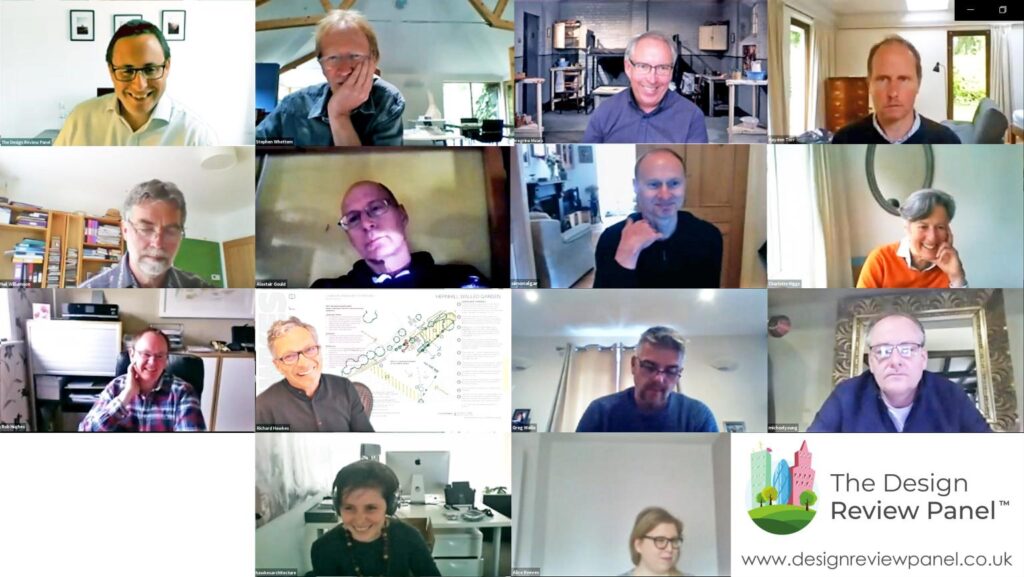Perry Mears values membership of The Design Peview Panel
As an experienced RIBA Chartered Architect, PMA Director Perry Mears enjoys and values his involvement as a member of The Design Review Panel; visit their website.
“The Design Review Panel is a group of independent, multi-disciplinary construction professionals working in the built environment, operating throughout England”, explained Panel Manager, Jonathan Braddick. He continued:
“The Panel provides impartial, expert advice to applicants and local authorities on a diverse range of design issues. These might include important new development schemes and proposals for public spaces, encompassing significant minor and major planning applications, in addition to pre-application development proposals. The National Planning Policy Framework (NPPF) explicitly states that The Design Review Panel’s feedback is a material consideration for both the local authorities and planning inspectorate when determining planning applications.”

Perry Mears highlights the value of The Design Review Panel
“We visit the site, which is invaluable and then discuss and explore all aspects of the application. The diverse range of property experts, which change on each panel visit, invariably stimulates quality, thought-proving and inspiring discussions. The outcomes of our days are so valuable, for both applicants and local planning authorities.”
The key benefits are summarised below.
- Feedback from The Design Review Panel is a material consideration.
The opinions and conclusions of these experts are well-respected and valued, given important consideration in the decision-making process. In accordance with paragraph 138 of the NPPF (National Planning Policy Framework) local authorities should have regard to recommendations made by design review panels.
- Independence and Impartiality of The Design Review Panel.
Unlike many other panels, The Design Review Panel is not appointed by any local authorities or developers under any ongoing contractual or framework agreements, and therefore it has no financial incentive or pressures. All Panel members are volunteers, only reimbursed out-of-pocket expenses, carefully chosen to ensure there are no personal or political conflict of interest. The Design Review Panel provides an objective perspective, independent and separate from the project team or local planning authority. This impartiality is crucial in identifying potential issues or areas for improvement. The different, rich perspectives of our experts can materially help to support challenging proposals. Their view is objective and impartial, ensuring that the project has been evaluated, fairly and thoroughly, meeting the appropriate standards of quality and functionality.
The independent and impartial nature of The Design Review Panel ensures that the
feedback seeks to promote and support high quality and sustainable design, without any pressure of compromise by local politics or any commercial interests.
There is a growing concern over the impartiality and effectiveness of local authority-run or procured design review panels. This concern isn’t just about the integrity of the design review process, but also raises significant legal and competitive questions.
The insistence by some local authorities on using specific design review panels, particularly those with which they have contractual arrangements or are operated by the local authorities, can clearly be problematic. An independent panel provides unbiased, objective feedback, ensuring that design decisions are made based on the project’s merit, quality, and suitability. This impartiality upholds the public interest and maintains the integrity of the design review process; this is it’s very essence.

A 2023 appeal decision in South Cambridgeshire (Case Reference: APP/W0530/W/22/3302832) highlighted the importance of an independent Design Review Panel. Here, the Planning Inspectorate emphasised the significance of considering design review panel recommendations in the decision-making process, regardless of whether the panel was a national design review panel or a local Design Enabling Panel (DEP), with greater local knowledge.
The appeal decision stated:-
“The Council have raised concern that their own design enabling panel (DEP), with greater local knowledge, was not used by the appellant … Regardless of whether using a national DRP or the local DEP, paragraph 133 [now 138] of the Framework states local planning authorities should have regard to the outcomes and recommendations of a DRP.”
This statement highlights that the key consideration is not who operates the design review panel, but the quality and relevance of its recommendations.
Importantly, the Planning Inspectorate’s decision observed;
“The Council have raised concern that their own design enabling panel (DEP), with greater local knowledge, was not used by the appellant. However, I note that the Council did not, in response to the application being received, conduct its own consultation with the DEP.”
This powerful statement highlights the significance given to the feedback from an independent Panel, demonstrating that it is inappropriate for a local authority to seek to insist on the use of their own internal panel. Such insistence can undermine the perceived neutrality and effectiveness of the design review process.
The independence of The Design Review Panel is a cornerstone of fair, unbiased, and effective design evaluation, in the planning process. Local authorities should recognise the real and significant value of independent panels and ensure that their recommendations are given due consideration, ultimately leading to better, more universally acceptable design outcomes.
- Large National Multidisciplinary Pool of Volunteers
The Design Review Panel has a large pool of highly experienced, multidisciplinary property professionals, all volunteers, operating professionally throughout the country. The Design Review Panel’s pool includes Urban Designers, Chartered Landscape Architects, Chartered Town Planners, Transport Planners, Engineers, Ecologists and Chartered Architects. The Design Review Panel carefully balances the need for local/regional knowledge, always ensuring no local conflict, drawing on the most appropriate expertise for any given project.
- Early Engagement Ensures a Constructive Process
It is clear that early engagement with a design review panel can lead to more effective, efficient, and ultimately successful design outcomes. A proactive approach to obtaining early expert, professional design feedback, reduces significantly the likelihood of costly late-stage changes, and fosters a collaborative and consensus-driven process, leading to the best outcomes.
- Incorporation of Feedback at Initial Stages: Engaging with the Panel early in the design process allows for the incorporation of their feedback when it is most effective and least costly to implement. Early changes are typically less expensive and easier to execute.
- Avoiding Potential Pitfalls: Early engagement helps identify potential issues or challenges that might not be apparent to the hands-on design team. This healthy, proactive approach allows for adjustments saving time, resources and costs in the long run.
- Enhancing Design Quality: Input at the outset from The Design Review Panel can significantly enhance the overall quality of the design; the expertise available within the Panel is a rare opportunity. The Panel’s expertise and diverse perspectives can contribute to more innovative, functional, and aesthetically pleasing designs. This approach is inspirational.
- Streamlining the Approval Process: In many cases, obtaining approval from various stakeholders is critical. Early engagement with The Design Review Panel can streamline this process, ensuring that the design is more likely to meet the necessary standards and requirements.
- Building Consensus and Stakeholder Buy-In: Early engagement allows for a collaborative process. This approach helps build consensus among stakeholders, including the design team, the Panel, potentially the public and end-users, importantly leading to greater support and buy-in for the project.
- Significant long-term Cost Savings: Addressing potential design issues early can lead to significant long-term cost savings. It is well-known that the requirement for redesigns, alterations, and problem-solving at later stages invariably generate frustrations, are time-consuming and add materially to costs, all of which may be avoidable.
Perry Mears summarised:-
“I’ve been invited to various Panel reviews, in various parts of the country, always thoroughly enjoying and valuing my involvement. The process is robust, the approach and discussions are comprehensive and probing, undoubtedly adding real benefit and value. It always creates a great opportunity to meet other property experts with diverse skills and experience, from around the country and I invariably learn from their expertise, skills, professional experiences and perspectives.”
Visit The Design Review Panel
Panel Member I Perry Mears
